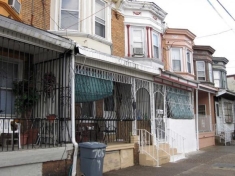Partnering for Housing Justice

The New Jersey Housing Justice Corps trains and deploys new lawyers to partner organizations around the state.
Camryn* did everything right. They lost their job due to the COVID-19 pandemic and relentlessly searched for similar employment. Falling behind on rent, they applied for and secured additional rental assistance through the New Jersey Department of Community Affairs. They were still faced with a lockout date and the threat of homelessness even though they came to an agreement with their landlord to pay their outstanding balance with the secured funds. Camryn’s story is not unique. New Jersey’s homeless population increased by eight percent in 2022 according to NJCounts, a point-in-time tally conducted each year by The New Jersey Housing and Mortgage Finance Agency in partnership with Monarch Housing Associates.
In response to this growing problem, the New Jersey Housing Justice Corps (HJC) officially launched in September 2022. HJC is a fellowship program designed to address housing instability by placing recent law school graduates and newer attorneys in public interest organizations throughout the state. Depending on their host organization, fellows may provide direct legal services to tenants with low and moderate incomes; engage in community outreach and education; participate in impact litigation; or contribute to policy and advocacy work. The HJC is a unique collaboration between Seton Hall Law School and Rutgers Law School’s Camden and Newark locations, funded by the New Jersey Legislature.
Indeed, one of the goals of the HJC is to expand the capacity of these partner organizations to serve more clients. But it will also build a cohort of extremely well trained and passionate legal changemakers, who will hopefully remain in the state after their fellowships, continue this important work, and contribute to the housing justice movement.
The HJC was created on the heels of a statewide effort deployed during the COVID-19 pandemic. “The New Jersey State Legislature provided funding during the pandemic to the state’s law schools—Seton Hall Law and Rutgers Law—to provide assistance to low- and middle-income people whose housing stability was impacted by the pandemic,” says Associate Dean for Pro Bono and Public Interest Jill Friedman. Thanks to this funding, the law schools were able to expand their pro bono services and clinics to address housing justice on a wider scale, whether it was taking on more clients, educating tenants about the rent moratorium, partnering with community groups, or advocating for livable conditions while the courts slowed down.
“As the most ferocious part of the pandemic came to a close, we wanted to build an even more sustainable infrastructure for and culture around housing justice,” says Friedman, “and so we created the Housing Justice Corps.”
Today, 11 fellows are working across the state in organizations representing various touchpoints in housing justice, from Camden to Trenton to Jersey City. Some provide direct legal services, while others focus on advocating for fair housing at the municipal or state level. Some focus on serving the disabled population and others focus on immigrant communities. What ties them together is their commitment to supporting housing justice statewide.

Esmé Devenney (RLAW’22), who has been placed with the Fair Share Housing Center in Mount Laurel, New Jersey, was immediately interested in applying to the HJC because it offered her the opportunity to pursue social, racial, and economic justice at the start of her legal career. “Entering the public interest arena can be difficult for new graduates because the work is devalued,” she says. “This of course is at the expense of people who need housing justice. As a result, the HJC fellowship allows new lawyers to jump right into work they are passionate about and address New Jersey's current housing crisis.”

In addition to creating a pipeline of new public interest attorneys, the fellowship also enhances the network of statewide housing advocates. “Placing fellows at different organizations gives both the fellows and also the organizations opportunities to work communally,” says Nina DePalma, a fellow placed at Volunteer Lawyers for Justice in Newark, New Jersey. “These relationships between fellows will support existing relationships between organizations, which is crucial because most clients do not just have one legal issue—poverty creates instability in every aspect of life.”
Fellows receive in-depth training during the first few months of the program, covering topics like poverty, housing instability, and policy, as well as skills-based instruction in effective communication, trauma informed lawyering, ethics, and more. This culminates in an intensive one-week training with the National Institute for Trial Advocacy in November, concentrating on interviewing, negotiations, and trial skills.
Finally, in addition to the work they’ll do with their host organizations, fellows are tasked with working on a year-long project either independently or in small groups. Designed to round out their experience, the project should tackle an issue the fellow isn’t addressing in their placement; this could take the shape of community education, drafting legislation, or proposing an idea for the state. “What’s exciting is that the group of fellows have started referring to themselves as a coalition,” says Anne Mallgrave, director of the Housing Advocacy Clinic, who is capitalizing on her decades of clinical legal teaching experience to serve in a mentor/coach role with the Corps members. “They’ve taken on this mantel of being instruments of change, which is incredibly encouraging.”
Camryn’s case was dismissed after HJC filed an emergency motion with the Court to prevent the lockout and argued on their behalf over several months of hearings. Camryn is no longer in danger of losing their home.
*Name and pronouns changed to protect the client’s privacy